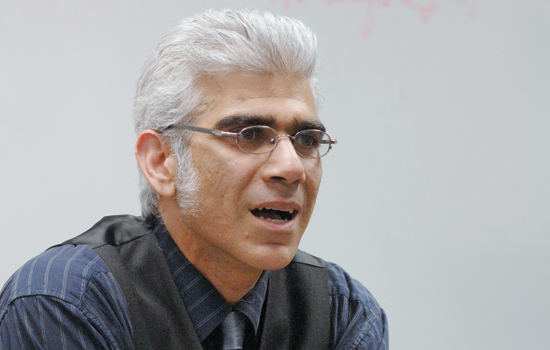Course examines President Obama’s ‘pragmatic’ philosophy
Babak Elahi discusses a chapter from Barack Obama's memoir with students taking a course on the philosophy and writings of the 44th president.
A new course in the departments of English and philosophy is examining the life and philosophy of President Barack Obama and how they have affected his leadership and public policies. The class uses Obama’s memoirs and his public speeches as well as other writings to enhance understanding of the man, his motivations and how he is likely to act as president.
“Barack Obama’s political philosophy is often described as ‘pragmatic’ but that can mean a lot of things,” notes John Capps, associate professor of philosophy, and one of the creators of the course. “By placing him in a broader philosophical context we can see better how his pragmatism is grounded in specific ideals and principles and how these then guide his decisions.”
“Obama is one of the few presidents who has produced a significant body of writing, including multiple memoirs, prior to becoming president,” adds Babak Elahi, associate professor of English, who is teaching the class with Capps. “This provides a large body of work for review both to better assess his political philosophy and to study his writing style and how he has used it to promote his ideas.”
The class focuses on Obama’s writings as well as other authors such as W.E.B DuBois, Malcolm X, Richard Rorty and William James. Capps and Elahi have also invited speakers to provide first-hand accounts of Obama’s decision making in action. Recently they were joined by phone by Bill Burton, White House deputy press secretary, and Jon Favreau, Obama’s head speech writer. Obama is a storyteller at heart, they said, who makes his decisions based on the facts and common sense.
Both professors hope the class will provide students with more insight into how personal political philosophies develop and how they are actually implemented as public policies, while also providing a deeper understanding of Obama and his influences.
“Whether you agree with Obama’s politics or not, he is a compelling and important political figure. Studying his philosophical and literary influences helps us understand how he became president, how he understands himself, and what he is likely to do over the next several years,” adds Capps.







